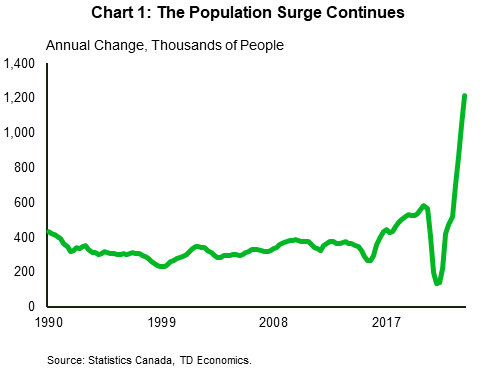HIGH GROWTH IMMIGRATION STRATEGY WIDENS THE HOUSING SHORTFALL

Canada has experienced a population boom — growing by over 1.2 million in the past 12 months, surpassing the pace seen in previous years. A recent report from TD Economics delves into whether the swing in population has gone too far, too fast.
The surge, referred to as the “great Canadian migration,” is the result of a combination of factors, including increased immigration targets and a significant rise in non-permanent residents (NPRs). While this influx has helped address labour market shortages, it has also led to various challenges in housing, healthcare, infrastructure and overall societal balance.

The surprising population expansion and its drivers
The government aims to welcome 500,000 immigrants annually by 2025, but the recent surge has been primarily due to the entry of NPRs. Approximately 60 per cent of the population influx over the last year was attributed to the NPR channel, catching economists off guard.
The impact on housing, healthcare and infrastructure
The sudden population surge has had a substantial impact on various aspects of Canadian society. One major concern has been the effect on the housing market, exacerbating affordability issues across the country. Even with government efforts to accelerate construction, TD economists estimate that continuing a high-growth immigration strategy would widen the housing shortfall by about a half-million units within just two years.
The increased population has also strained Canada’s healthcare system and infrastructure. The country ranked low in the number of acute care hospital beds per capita, even before the recent population boom. This has necessitated a more balanced approach to infrastructure development, considering not only housing but also medical capacity and social support platforms.
The report’s authors write, “While the right hand has been solving for labour market shortfalls, the left hand has not put in place the appropriate infrastructure to absorb this large influx of people, particularly if the intention is for a continuation on a longer-term basis.”
Will it be repeated?
According to economists, early indications suggest that the rapid acceleration in population growth will continue through 2023. The NPR classification, including work or study permit holders and asylum seekers, remains on the rise, and there is a possibility of another one-million-person year or higher.
Government policies and their benefits and pitfalls
Canada’s success in recruiting workers from around the world has positively impacted the labour market, leading to higher job growth and lower unemployment rates. However, there are concerns that importing workers across skill levels might discourage employers from addressing productivity issues. Canada’s low investment in research and development and weak labour productivity rankings among G7 countries underscores the need for a balanced approach to addressing labour shortages and enhancing productivity.
Economists implore that policy decisions must strike the right balance between increasing labour availability and promoting investments in productivity-enhancing measures.
Housing struggles
The housing market faces significant challenges as demand outstrips supply. TD economists’ estimates show Canada may fall short of supplying housing demand by about 215,000 units from 2023 to 2025. If population growth remains at record levels, the housing supply-demand gap could swell to over 500,000 units.
“Perhaps even more concerning is that even if population growth slows back towards a long-term average that undershoots our baseline path, the country would still be deficient by about 150,000 units,” the authors write. “In other words, housing supply will struggle to keep pace with Canada’s rapidly expanding population under each scenario. A meaningful improvement in affordability will likely remain elusive.”
Challenges for the Bank of Canada
The report’s authors call the population surge “textbook demand shock,” with the influx of new consumers creating a disconnect between demand and supply.
“Over time, the boost to industry profits, labour income and government tax revenues helps re-align priorities to what’s in high demand versus what’s in short supply. However, the operative words in that sentence are ‘over time.’ The speed of change matters to whether the economic and social factors can catch up.”
As a result, economists say the Bank of Canada may need to address this persistence through higher interest rates. Additionally, home price inflation becomes a complex issue to tackle: “And there isn’t quite as easy a solution when it comes to home price inflation…this is one area in the economy that can be particularly problematic due to its long reach in influencing prices directly within the economy, as well as expectations of future inflation.”

Finding the right balance
To address the challenges posed by population growth, economists say Canada needs to balance its immigration policies with sustainable growth strategies. Removing workplace barriers can unleash supply within the existing population while right-skilling individuals to address labour force shortages.
“A lot can be done to better integrate both new and existing Canadians so that people can reach their full potential. It can’t just be a matter of bringing in an unchecked amount of people to take the lower-paying jobs on offer — particularly if it underutilizes the workforce and disincentivizes companies to invest.”
From the Real Estate Magazine
